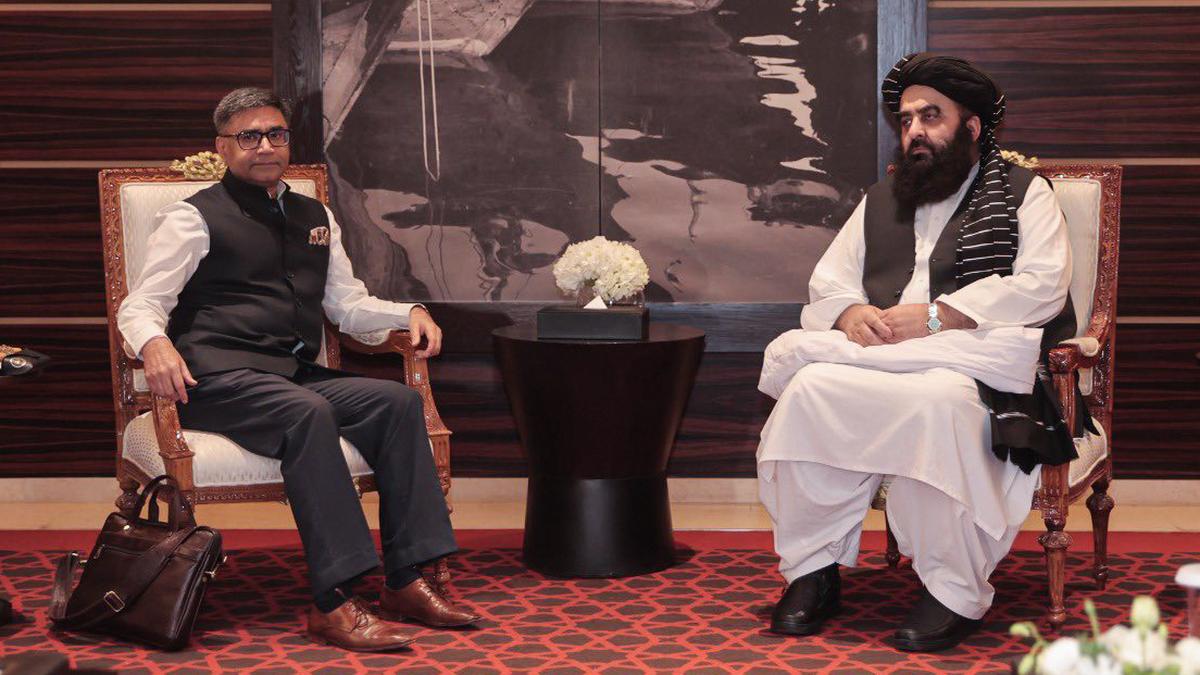Foreign Secretary Vikram Misri and Afghanistan’s acting ‘Foreign Minister’ Amir Khan Muttaqi in Dubai.
| Photo Credit: ANI
India continues to get closer to the Taliban, with reports that Prime Minister Narendra Modi will allow the regime in Afghanistan to appoint a new envoy for its embassy in New Delhi.
This comes on the heels of the first high-level meeting between India and the Taliban in January, with India’s Foreign Secretary Vikram Misri and acting Taliban ‘Foreign Minister’ Amir Khan Muttaqi meeting in Dubai to discuss strengthening political and economic ties, and providing humanitarian aid.
India’s relationship with the Taliban has been trending this way for some time, beginning when New Delhi reopened its embassy in Kabul in June 2022, almost a year after the Taliban retook power in Afghanistan.
But accepting a Taliban diplomat in India would be a significant shift, all but recognising the regime as the legitimate rulers of Afghanistan.
This is something most countries have refused to do because of the Taliban’s abysmal treatment of women, with 1.4 million school-age girls deliberately denied their right to education and women forbidden from most jobs. More recently, women have also been banned from beauty parlours and national parks, cruel steps to remove them from the public eye. The situation is so bad it has been called “gender apartheid” by United Nations experts. New Delhi believes that this is the time to back the Taliban, seeing a chance to gain influence in a country seen as strategically important for India’s interests.
China’s quick moves
China has already beaten India to Kabul, becoming the first country to accept the credentials of a Taliban envoy last year and funding several infrastructure projects in Afghanistan. Beijing is also considering letting the Taliban join its lucrative Belt and Road Initiative, which would bring the regime firmly into its sphere of influence.
India can also get a jump on rival Pakistan, with its formerly warm relationship with the Taliban now ice-cold. Once seen as natural allies, the Taliban has sought independence from Islamabad and has forged relationships with the wider region, including China, Russia and its Central Asian neighbours. A former patron of the Taliban, Pakistan now finds itself lacking influence in Kabul.
A wave of terror
But engaging with the Taliban comes with significant risks, something India will need to consider before it gets involved in Afghanistan.
The country has become a hotbed for terrorism under the Taliban. The Islamic State (IS) is running rampant, conducting deadly terror attacks across Afghanistan that target the regime and the interests of its allies.
This includes the assassination of Taliban ‘Minister’ and powerbroker Khalil Ur-Rahman Haqqani in December and threatening to bomb the Chinese embassy in Kabul in 2023. This came after an IS attack on a Kabul hotel popular with Chinese nationals in 2022 that left three dead and injured 18 people.
Russia has also been targeted, witnessed by the IS attack on Moscow’s Crocus City Hall in March 2024 that killed at least 140 people and injured more than 500. In early March this year, Russia’s security agencies killed a man in a shootout in a Moscow subway who was suspected of being affiliated with the IS.
The Taliban has also been accused of supporting its affiliate, the Tehrik-e Taliban, to carry out attacks in Pakistan. A spate of attacks late last year led to Pakistan conducting airstrikes on terror camps in Afghanistan and subsequent clashes at border crossings between the Taliban and Pakistan’s armed forces.
The relationship between the Taliban and Islamabad has completely broken down over the Taliban’s inability to reign in terror groups operating within Afghanistan. The problem is getting worse, not better, with the Tehrik-e Taliban claiming to have carried out 147 attacks on Pakistani soil in February alone, killing 180 soldiers. Recently, the group’s affiliate, the Jaish Al-Fursan, claimed responsibility for a suicide bombing at an army compound in northwest Pakistan that killed nine and injured 25.
It is a matter of concern that India has already caught the ire of the IS. In December, the group claimed responsibility for an attack on the Indian consulate in Jalalabad that killed one person and injured two others. This came after a United Nations report last year said that the IS has sought to recruit ‘lone actors’ to carry out large-scale attacks in India. India is now clearly in the firing line.
Need for caution
New Delhi has long called for Afghanistan to be free of terrorism, and this should be a key demand before any further engagement with the Taliban takes place. This includes the Taliban collaborating with regional partners to defeat the IS and forcing the group to renounce the support of the Tehrik-e Taliban.
Afghanistan has always been a dangerous place to be invested in, having suffered from political instability and terrorism for decades. The Taliban’s inability or unwillingness to solve these problems makes it just as risky a prospect today.
India should heed the lessons of rivals China and Pakistan, who have had their fingers burnt after engaging with the Taliban and investing in Afghanistan. With India’s tragic history of terrorism at home, New Delhi might decide this is a risk just not worth taking.
Chris Fitzgerald is a freelance journalist covering Afghanistan and director of the Platform for Peace and Humanity’s Indo-Pacific program
Published – March 18, 2025 12:08 am IST

